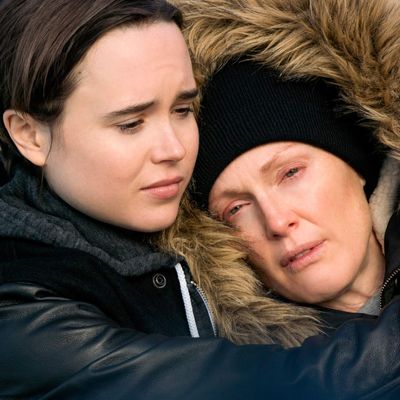
A sallow, didactic little movie that proves modesty isn’t always a virtue, Freeheld portrays the real-life struggle of Laurel Hester, a brave Ocean County, New Jersey, detective who, after a diagnosis of late-stage lung cancer, attempted to ensure that her pension benefits would go to her domestic partner Stacie Andree after her death. New Jersey as a state had recognized same-sex partnerships, but this was a county matter, so Hester had to convince the five-man Board of Freeholders to agree to her request. They refused. She fought back, and her case became a cause célèbre, transforming sleepy, sparsely attended county board hearings into hotbeds of protest and controversy. The events were laid out with suspense and passion in Cynthia Wade’s short, Oscar-winning 2007 documentary Freeheld. This narrative version loses both the suspense and the passion.
Okay, that’s not entirely fair. For its first half-hour or so, as it depicts the early days of Laurel’s (Julianne Moore) relationship with the younger Stacie (Ellen Page), whom she meets at a volleyball game, Freeheld benefits from the subtleties of some of its performances. Moore gives Laurel a touching inner conflict. We see her initial awkwardness with Stacie, but we also see how, once the cop side of her personality takes over, she becomes more confident, direct, aggressive. Their first date dramatizes the split nicely: Laurel is all hesitance and uncertainty as they dance and talk and get closer; then three guys attempt to rob them, and she whips out her gun. Once the men have fled, she turns to Stacie: “I’m a police officer … I think you should come home with me.”
But as Laurel receives her dreadful diagnosis and gets sicker and sicker, the film starts to deflate. Ironic, perhaps, because this is when director Peter Sollett (Raising Victor Vargas) and screenwriter Ron Nyswaner (Philadelphia) actually try to inject some vitality. Laurel’s case is taken up by Steven Goldstein (Steve Carell), a flamboyant gay-rights lawyer whom we first see with a close-up of a purple yarmulke reading “Garden State Equality.” (“It’s Steven, with a V, as in ‘very gay’” is how he introduces himself.) Also joining the fight is Laurel’s strong-but-silent work partner Dane Wells (Michael Shannon, typically excellent at conveying humanity beneath that bruiser exterior of his), who finds himself on the receiving end of his colleagues’ scorn when he sticks up for Laurel and Stacie.
There’s potentially a nice conflict here, between the pragmatism of Dane and the activism of Steven. (“This is a circus!” one yells. “It’s political theater!” the other responds.) But the film doesn’t quite know how to convey that conflict with any nuance or dramatic verve. Perhaps seeking not to sensationalize or to Hollywood-ize a story set in a drab, mundane world, Sollett shoots without any frills. That’s usually a good thing, but here it helps to suck the life out of the material — in part because Nyswaner’s screenplay seems to have settled for the most direct, speechifying way of dramatizing the issues at hand. More important, the film loses sight of the humans at its center. As we get more and more protests and controversy and backroom wheeling and dealing, Stacie and Laurel fade into the background. Maybe that’s intentional: One could say that Freeheld forsakes the individual for the collective, as a dying woman’s cause becomes a symbol for a national civil-rights movement. “Like it or not … you’re a gay-marriage activist now,” Steven tells her late in the film. The cause is beyond them now. But a cause does not a movie make.


